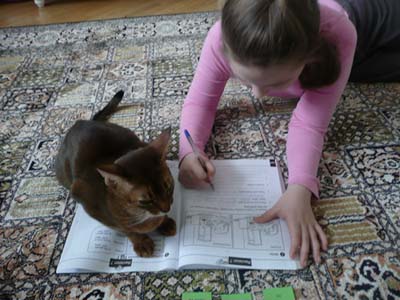What My Young Learners Have Taught Me
I started teaching kids very early in my teaching career. At that time I wasn’t a certified English teacher yet but just a linguistics graduate. That’s why I had no idea how to teach and just copied the techniques my university teachers had used. When it came to teaching kids, it was a completely unexplored domain for me too. At first, I tried to teach them as I taught adults but very soon I realized it was a mistake: it just didn’t work. I still haven’t got any formal training on teaching languages to kids but thanks to my six-years of experience, I think I’m doing it much better than I did at the beginning: my young learners have taught me how to teach them right. Here are some lessons they taught me.
Lesson #1 – Every Kid Is Unique
The cornerstone idea of teaching English to young learners is that every kid is unique. This seemingly simple idea threads through everything and has several practical consequences.First of all, not every kid has learnt yet how to behave appropriately in a classroom: they act naturally in the way they do at home. So sudden tantrums or burst of tears shouldn’t be a surprise: kids are just showing their true personalities and don’t know how to hold back. Secondly, being natural and sincere, kids subconsciously expect the same from their teacher. So there is no point in pretending or trying to distance yourself from the kids – they will immediately feel it and will lose interest in your lessons and trust in you. Thirdly, you can never be sure that what worked well with one kid will work with another. Kids have absolutely different characters and preferences in everything: games, fairytale characters, cartoons, animals, classroom activities and pastimes! So it’s very important to learn about your learners as much as possible. Every piece of information is valuable as you can exploit it or, on the contrary, avoid using in your lessons. It will influence the choice of classroom activities and topics kids will be most engaged in and thus the choice of activities, which are most productive in terms of learning.
Lesson #2 – Active Participation
Another aspect of teaching young learners is their active participation in the lesson. Let kids be active and initiative, let them change an activity or a game in the way they want – if they do so, this is a good sign of kids’ genuine interest and true involvement in the activity. So even if your meticulously elaborated lesson plan is going down the drain because the kids want to do tasks their own way, don’t be upset too much: the most important thing here is that they WANT to do the activities and thus they learn!
Lesson #3 – Exploit The Surroundings
Another thing I’ve learnt from my young learners is that a teacher should exploit the surroundings as much as possible. If you teach kids at their home, there are lots of things such as favourite toys, pets, sometimes even parents that can be happily integrated into a lesson. For example, when I was teaching a 10-year-old girl who had a pet cat, I decided to involve it in our lessons to remove stress and boredom and bring in some relaxation and fun. Here is the photo of Tyoma the Cat helping my student Katya to do her school homework.
If kids come to your classroom or house, ask them to bring their favourite toys, but make sure that these toys foster but not hinder the learning. Otherwise, toys might become a serious destruction.
Lesson #4 – There Aren’t Bad Kids
There is one more thing about teaching young learners: there aren’t bad kids, though there are probably some kids that might be experiencing some problems. If this is the case, never hesitate to contact parents about the issue because everything concerning a little kid is important. But before turning to parents for help, try to solve the problem directly with the kid – they will appreciate it and will definitely feel more valued and grown-up.
Still Learning
These are the main lessons I’ve learnt from my young learners. But my learning is still going on because every other lesson with my little students is a new lesson to me. I know I haven’t completely mastered the skill. And, to be honest, I don’t actually think there couldn’t be any limit to perfection. So, for those who have never taught kids and feel a bit scared about this, I could say, “Give it a go” and you will see how much fun it could be and how much you can learn about people skills and teaching in general. So, give it a go!



I love it, Sasha! Great lessons to learn;)
Thank you, Vladka! 🙂 I sometimes wish I was a young learner! 🙂 And, by the way, with the help of the tips from your post, I now understand it is quite possible 🙂
Hi Sasha, congrats to this inspiring blog post and for being a new iTDi mentor! And the photo of Tyoma and your little student is fabulous! 🙂
Really important lessons, indeed, although things slightly change with the teaching context (if you teach large classes, I don’t think it is a good idea to tell them to bring their pets or favourite toys to classes every day 🙂 ).
Thank you for the great post!
Thank you for the post.It’s very interesting.